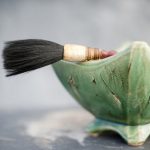From The Intelligent Optimist
Summer 2016
 An herbal skin solution
An herbal skin solution
Our modern lifestyle makes us an easy target for inflammation. The environment around us and our diets are full of substances that inflame our bodies—and that’s where almost every disease begins. Mainstream medicine is good at suppressing the symptoms of inflammation, but not very effective when it comes to eradicating the roots of it. Ancient traditions like Ayurveda, from India, are much better at that. Here’s an herbal cream that has surprisingly beneficial effects—as tested by our own editorial staff—when it comes to treating skin stricken with eczema, psoriasis and more. Among the ingredients are two well-known Indian herbs, turmeric and neem. Sorion Cream is not only suitable for sensitive, inflamed skin, but also ideal for skin that is very dry, itchy, flaky or blotchy. We were surprised that the effective herbs are mixed in a solution that contains Vaseline and paraffin wax—petroleum products—but the manufacturer assured us that their lab tests showed there is no better way to preserve the effectiveness of the Ayurvedic herbs. We can confirm that Sorion is one of the best skin care creams ever to pass through the offices of The Optimist. | $16 for 50 grams; summerherbal.com
_______________________
 Journeys of purpose
Journeys of purpose
From its first day on the Web, YouTube was identified with an icon showing a television. As the name implies, YouTube was to become your personalized television station. Today the site offers a wealth of creativity and inspiration that is the work of millions of users. People have published very special music playlists and—to support your needs for relaxation, fun or learning—lists of public speeches. There’s one challenge: how do you find all that good stuff? Most of us stumble upon it by
accident. Here’s one channel that we found that way but that should be a go-to place for readers of The Optimist: The Journey of Purpose (TJOP).
TJOP created a series of inspiring videos based on talks by British philosopher Alan Watts (1915–1973). Watts was a wonderful thinker with a remarkable voice. TJOP turned the old audio recordings into beautiful new video experiences. And the channel offers much more than Watts. If you want to feed your soul for a moment amid or after a busy day, TJOP is a great resource.
Jurriaan Kamp
_______________________
 A sound solution for the whales
A sound solution for the whales
Sonic Sea | Daniel Hinerfield, Michelle Dougherty | Sonicsea.org
Kenneth C. Balcomb III refers to March 15, 2000, as “the day of infamy,” and as one watches the heartbreaking opening scenes of a new documentary, Sonic Sea, it’s easy to accept that appellation. Balcomb is the executive director and senior scientist at the Center for Whale Research. On that day, on a beautiful beach in the northern Bahamas, he got word that a beaked whale was about to wash up on shore. Joining colleagues, he was trying to redirect the mammal back to the ocean when he got word of another whale washing up, then another, and another.
That day, 16 beaked whales died while frantically trying to escape the shallows in the area, and Balcomb wanted to know why. He flew whale specimens to Harvard Medical School for analysis and was told that the animals had blood around their ears and hemorrhaging in their brains. The cause: extreme noise, in this case made by Navy ships testing sonar systems, whose loud shrieks are used to find enemy submarines.
In the film you see other mass whale deaths—200 in one 2008 incident off Madagascar—caused by oil and gas explorers firing air guns with dynamite-like explosives to map the ocean. Then there are the cargo ships four football fields long whose massive engines can reach decibel levels that exceed what you’d hear sitting next to a giant speaker at a rock concert.
Oceans carry sounds so far that in one test, a blue whale’s song off the coast of Ireland could be heard off the Virginia coast, and in another, sounds made by researchers in the Indian Ocean were detectable in the waters off Washington State and also in the Atlantic Ocean. With as many as 60,000 cargo ships crossing the oceans at once, and near-constant high-decibel testing by oil prospectors and the U.S. Navy, it became clear to Balcomb and other researchers that human-caused noise pollution was killing our marine mammal kin, and it had to stop.
Activists took up the cause, and the Natural Resources Defense Council sued the U.S. Navy to require environmental reviews before testing could proceed. Pubic awareness, technological change and the willingness of perpetrators to change behavior has brought about positive change, to everyone’s benefit. The Navy is now staying away from breeding, feeding and migratory areas. Oil and gas explorers are using a device that produces a continuous low-frequency sound 1,000 times quieter than the air gun while also yielding higher-resolution images.
In 2014, the International Maritime Organization adopted voluntary guidelines for quieter ships. Hulls are being redesigned to have less metal underwater, which could reduce sound by 90 percent, while shipping lanes are being rerouted and ships are just slowing down the engines—which happens to save billions of dollars a year in fuel costs.
Some whales can live 200 years, so they know these are not the good old days, but at least it’s better than ever for the youngsters.
Narda Zacchino
_______________________
 Imperfection? Perfect!
Imperfection? Perfect!
If a valuable but rustic ceramic bowl chipped and developed a deep crack, what would you do? Toss it? Fill it in with clay and reglaze it? Under the Japanese aesthetic principle of wabi-sabi, the answer would be neither. You might infill that crack with gold or another contrasting material, emphasizing the imperfection and making it all the more beautiful in the process. Or you’d do nothing at all.
Wabi-sabi is a philosophy of life as well as of design, but it’s also the most difficult to pin down with a simple definition. That’s why people tend to describe it through examples. Wabi is a term for simplicity, but in a rough, rustic way; it originally meant living in nature. Sabi refers to the beauty inherent in aging, whether due to the patina of long years or the fleeting nature of things, the impermanence of life itself—and the sorrows that accompany it. In one story told to illustrate wabi-sabi, a leaf-littered garden is raked so that the ground is perfectly bare—and then the tree is shaken to send down a few more leaves.
The idea that life is more beautiful in imperfection could provide a saving grace in these airbrushed times, when photographs are faked into perfection. Cultures seem more and more obsessed with youth, even as the revolution-minded baby boomers approach retirement.
Several books have been written about living in wabi-sabi; many are disappointing, including the most recent, Wabi-Sabi Wisdom: Inspiration for an Authentic Life, by Andrea Jacques, who relies on a series of self-help success clichés: Cultivate group pride instead of the individual. Work less, nap more. Set goals in line with your passions and values.
The great beauty of wabi-sabi might lie in the difficulty explaining it. This is not wisdom handed to us in tidy packages; convenient, pretty explanations run counter to the very nature of the aesthetic. Perhaps it is a philosophy better contemplated than preached as we try to lean into the concept that beauty and wholeness might lie in the scars of life.
Karin Klein












